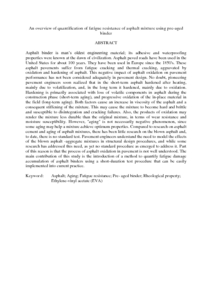Citation
Yousif, Rana Amir and Muniandy, Ratnasamy and Hassim, Salihudin and Mohd Jakarni, Fauzan and Aburkaba, Eltaher Elzarroug
(2015)
An overview of quantification of fatigue resistance of asphalt mixture using pre-aged binder.
WALIA Journal, 31 (S1).
pp. 125-132.
ISSN 1026-3861
Abstract
Asphalt binder is man’s oldest engineering material; its adhesive and waterproofing properties were known at the dawn of civilization. Asphalt paved roads have been used in the United States for about 100 years. They have been used in Europe since the 1850's. These asphalt pavements suffer from fatigue cracking and thermal cracking, aggravated by oxidation and hardening of asphalt. This negative impact of asphalt oxidation on pavement performance has not been considered adequately in pavement design. No doubt, pioneering pavement engineers soon realized that in the short-term asphalt hardened after heating, mainly due to volatilization, and, in the long term it hardened, mainly due to oxidation. Hardening is primarily associated with loss of volatile components in asphalt during the construction phase (short-term aging), and progressive oxidation of the in-place material in the field (long-term aging). Both factors cause an increase in viscosity of the asphalt and a consequent stiffening of the mixture. This may cause the mixture to become hard and brittle and susceptible to disintegration and cracking failures. Also, the products of oxidation may render the mixture less durable than the original mixture, in terms of wear resistance and moisture susceptibility. However, "aging" is not necessarily negative phenomenon, since some aging may help a mixture achieve optimum properties. Compared to research on asphalt cement and aging of asphalt mixtures, there has been little research on the blown asphalt and, to date, there is no standard test. Pavement engineers understand the need to model the effects of the blown asphalt -aggregate mixtures in structural design procedures, and while some research has addressed this need, as yet no standard procedure as emerged to address it. Part of this reason is that the process of asphalt oxidation in pavement is not well understood. The main contribution of this study is the introduction of a method to quantify fatigue damage accumulation of asphalt binders using a short-duration test procedure that can be easily implemented into current practice.
Download File
![[img]](http://psasir.upm.edu.my/43739/1.hassmallThumbnailVersion/An%20overview%20of%20quantification%20of%20fatigue%20resistance%20of%20asphalt%20mixture%20using%20pre-aged%20binder.pdf)  Preview |
|
PDF (Abstract)
An overview of quantification of fatigue resistance of asphalt mixture using pre-aged binder.pdf
Download (104kB)
| Preview
|
|
Additional Metadata
Actions (login required)
 |
View Item |

